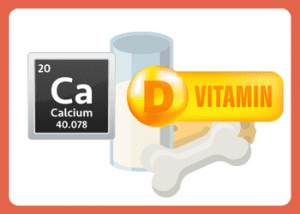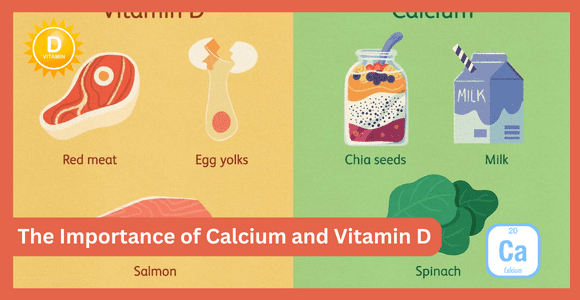Consuming adequate amounts of calcium and vitamin D is key for building strong bones and avoiding bone-related diseases like osteoporosis. Unfortunately, some individuals may not get enough from their diet alone.
That’s why taking supplements that contain these vital nutrients can be incredibly useful in ensuring your body receives all the essential minerals it needs to keep your bones healthy. In this article, we will explore how calcium and vitamin D are so important for strong bones as well as the impact of supplementing with them on your overall bone health.
Table of Contents
Calcium and Vitamin D Benefits
Calcium and vitamin D are irreplaceable nutrients that play a major role in preserving bone integrity and preventing diseases associated with bones. In this article, we will scrutinize every benefit of calcium and vitamin D while presenting scientific evidence to back up their worthiness.
A deficiency of amounts of calcium and vitamin D can result in a plethora of health issues, such as weakened bones, heightened risk for fractures, muscle fragility, and lowered immune system activity.
Calcium Benefits:
 Calcium is an essential mineral with vital roles in the body, from sustaining strong bones and teeth to facilitating nerve transmission, muscle contraction, and blood clotting. Here are some specific benefits of calcium:
Calcium is an essential mineral with vital roles in the body, from sustaining strong bones and teeth to facilitating nerve transmission, muscle contraction, and blood clotting. Here are some specific benefits of calcium:
Benefit Evidence
- To ensure strong bones, it is essential that one consumes adequate amounts of calcium. Evidence reveals that taking supplemental calcium can significantly increase bone density and diminish the odds of fractures for postmenopausal women and elderly men alike. Maintaining your calcium intake is crucial in preserving healthy bones!
- Minimizing the danger of Osteoporosis is a top priority. This disease causes bones to become fragile and brittle, further increasing vulnerability to fractures. However, calcium consumption has been proven to reduce the risk of osteoporosis in aging women significantly!
- Taking calcium supplements may reduce your chances of developing hypertension, a severe risk factor for cardiovascular disease. Studies are inconclusive on this matter, but some have shown that taking these supplements can help lower blood pressure levels.
Vitamin D Benefits:
It is an essential fat-soluble vitamin that not only keeps your bones and teeth strong but also strengthens the immune system by reducing inflammation. It’s a must for overall well-being! Here are some specific benefits:
Benefit Evidence
- It plays a vital role in bone health by enhancing the body’s absorption of calcium from food. Without Vitamin D, our bodies would not be able to absorb enough calcium for adequate bone development and maintenance.
- D supplementation can improve bone mineral density, reducing the risk of fractures and osteoporosis. Evidence has revealed that those deficient in vitamin D are more predisposed to developing these conditions. Therefore, taking a supplement is an important step to safeguard against fragility associated with age-related issues such as osteoporosis.
- It has been linked to a possible decrease in numerous cancers, such as colorectal, breast, and prostate cancer. However, it is essential that further research be conducted in order to validate these discoveries.
- It aids the immune system and has been linked to a greater risk of respiratory illnesses, as well as autoimmune disorders if one is deficient in it.
Calcium and Vitamin D Together:
Vitamin D and calcium go hand in hand when it comes to preserving the strength of our bones. Vitamin D helps us absorb more calcium from the food we eat, while similarly, sufficient amounts of calcium are essential for providing support and structure to our skeletal system.
Without correct levels of both these vital nutrients, one cannot remain safe against potentially developing osteoporosis later on in life. Here are some specific benefits of calcium and vitamin D together:
Benefit Evidence
Supplementation of Calcium and Vitamin D can significantly reduce the risk of fractures in older adults, especially those who are more prone to falls. This is a fantastic way for seniors to safeguard their health and maintain an active lifestyle with greater confidence.
May reduce the risk of type 2 diabetes Some studies have shown that calcium and vitamin D supplementation may improve insulin sensitivity and reduce the risk of type 2 diabetes, although more research is needed to confirm these findings.
Both are essential nutrients that contribute to bone health, as well as the prevention of bone-related diseases. Calcium helps maintain strong bones and reduces the chances of fractures while vitamin D increases calcium absorption, supports the immune system, lowers blood pressure levels and even fights type 2 diabetes.
With the combined intake of these two supplements, adults over 65 can lower their risk for fracture injuries – it’s a win-win!
Calcium and Vitamin D Foods
Calcium is an essential mineral that is important for numerous functions in the body, including maintaining healthy bones and teeth, nerve transmission, and muscle function.
Here are some calcium-rich foods:
- Food Serving Size Calcium Content (mg)
- Milk (skim, low-fat, whole) 1 cup 300
- Yogurt (plain, low-fat) 1 cup 300
- Cheese (cheddar, mozzarella) 1 oz 200-240
- Sardines (with bones) 3 oz 325
- Salmon (with bones) 3 oz 180
- Spinach (cooked) 1 cup 240
- Kale (cooked) 1 cup 90
- Broccoli (cooked) 1 cup 60
- Tofu (calcium-set) ½ cup 250-750
 Vitamin D Foods:
Vitamin D Foods:
Vitamin D is a fat-soluble vitamin that is critical for maintaining healthy bones and teeth, as well as supporting immune function and reducing inflammation.
Here are some vitamin D-rich foods:
- Food Serving Size Vitamin D Content (IU)
- Salmon (cooked) 3 oz 447
- Tuna (canned in water) 3 oz 154
- Egg yolks 1 large 41
- Mushrooms (exposed to UV light) 1 cup sliced 400
- Fortified milk 1 cup 100
- Fortified orange juice 1 cup 137
- Fortified breakfast cereals 1 cup 40-100
- Cod liver oil 1 tablespoon 1,360
Foods Containing Both Calcium and Vitamin D:
Some foods naturally contain both calcium and vitamin D, while others are fortified with these nutrients. Here are some examples:
- Food Serving Size Calcium Content (mg) Vitamin D Content (IU)
- Fortified milk 1 cup 300 100
- Fortified orange juice 1 cup 350 137
- Fortified breakfast cereals 1 cup 1000 40-100
- Yogurt (fortified with vitamin D) 1 cup 300 80-100
- Sardines (with bones) 3 oz 325 160
- Salmon (with bones) 3 oz 180 447
- Tofu (calcium-set, fortified with vitamin D) ½ cup 250-750 80
Calcium and vitamin D are key nutrients that play an integral role in fostering strong bones, teeth, and other functions within the body. Dairy products provide both calcium and vitamin D; nevertheless, there are also numerous dairy-free sources of these minerals such as fish, leafy greens, and fortified foods to name a few.
It is therefore essential for overall health to follow a balanced diet consisting of various sources of calcium and vitamin D for optimal wellness while also lessening the risk of diseases associated with bone issues.
Calcium and Vitamin D Side Effects
While calcium and vitamin D are essential nutrients for overall health and well-being, excessive intake of these nutrients can have side effects. Here are some potential side effects of excess calcium and vitamin D intake:
Excess Calcium Intake:
- Symptom Severity
- Constipation Mild to Moderate
- Nausea/Vomiting Mild
- Kidney Stones Moderate to Severe
- Hypercalcemia (High Blood Calcium Levels) Severe
Excess Vitamin D Intake:
- Symptom Severity
- Nausea/Vomiting Mild
- Weakness/Fatigue Mild to Moderate
- Headache Mild
- Loss of Appetite Mild to Moderate
- Hypercalcemia (High Blood Calcium Levels) Severe
It is important to note that the risk of experiencing side effects from calcium and vitamin D intake is rare, especially when consumed from natural sources such as food. However, excessive intake of supplements can increase the risk of these side effects.
Foods containing both Calcium and Vitamin D are a great way to get these essential nutrients without the risk of side effects from supplements. Examples of such foods are fortified milk, orange juice, breakfast cereals, and yogurt, as well as fish such as salmon and sardines with bones and tofu.
When it comes to supplements, it is important to follow the recommended daily intake levels to prevent the risk of side effects. If you are considering taking calcium or vitamin D supplements, it is always best to consult with your healthcare provider first.
What are the Side Effects of Taking Calcium With Vitamin D
Taking calcium with vitamin D can have potential side effects, especially when taken in excessive amounts. Some possible side effects of taking high doses of calcium with vitamin D include constipation, nausea, vomiting, weakness, and hypercalcemia (high blood calcium levels).
It is important to follow the recommended daily intake levels and to consult with a healthcare provider before starting any calcium or vitamin D supplement regimen.
Why Do Doctors Prescribe Vitamin D with Calcium?
Vitamin D is a necessary nutrient for the body to be able to process and use calcium, which can help prevent weakened bones or fractures. Moreover, it helps maintain normal levels of both calcium and phosphorus in circulation around the body; this is why doctors regularly prescribe D with Calcium.
They are essential for maintaining bone health, especially when it comes to fighting osteoporosis. When these two nutrients work in tandem, they can benefit bones by allowing the body to effectively absorb and use calcium – which is key for preventing or treating this condition characterized by weakened bones. That’s why supplementing with both calcium and D together is recommended as a proactive measure to achieve optimal bone health.
Calcium and Vitamin D Recommendations for Osteoporosis: After carefully evaluating the meta-analyses, we recommend postmenopausal women with osteoporosis consume a daily total of 1200 mg of calcium and 800 international units of Vitamin D for optimum prevention and protection.
Best Time to Take Calcium With Vitamin D3
Calcium supplements come in different forms, primarily calcium carbonate and calcium citrate. The timing of your calcium intake depends on the type of supplement:
- Calcium Carbonate: This form is best absorbed when taken with food because stomach acid produced during digestion helps dissolve the supplement. Taking calcium carbonate with meals can increase absorption by up to 40%. Therefore, incorporating calcium carbonate with breakfast or lunch is recommended.
- Calcium Citrate: This type does not require stomach acid for absorption and can be taken with or without food. However, to avoid gastrointestinal discomfort, it might be beneficial to take calcium citrate with meals.
Dividing Doses
The body can absorb only about 500 mg of calcium at a time. If your daily calcium requirement or supplement dose exceeds this amount, split it into smaller doses throughout the day. For example, take one dose in the morning and another in the evening.
Best Time to Take Vitamin D3
Vitamin D3 is fat-soluble, meaning it is best absorbed when taken with a meal that contains fat. Research suggests that taking vitamin D3 with your largest meal of the day, which typically has the highest fat content, can enhance absorption. This could be lunch or dinner, depending on your dietary habits.
Combining Calcium and Vitamin D3
Taking calcium and vitamin D3 together can be beneficial, particularly if taken with a meal containing some fat. For maximum absorption, consider a meal that includes healthy fats like avocados, nuts, seeds, or olive oil.
Consistency is Key
For optimal benefits, consistency is crucial. Take your supplements at the same time each day to maintain stable blood levels of these nutrients.
Timing and Sleep
While there’s no strong evidence that taking calcium and vitamin D3 affects sleep, some people report that taking these supplements in the evening can interfere with their sleep patterns. If you experience this, consider taking your doses earlier in the day.
For the best results, take calcium carbonate with meals, calcium citrate with or without food, and vitamin D3 with your largest meal of the day. Splitting your calcium dose and maintaining consistency in your supplement routine will help you maximize the benefits for bone health. Combining these strategies will ensure you optimize the absorption and efficacy of calcium and vitamin D3, contributing to stronger bones and better overall health.
Frequently Asked Questions
Should vitamin D and Calcium be Taken Together?
Women who are expecting or nursing should consume the same amount of calcium and vitamin D as other women their age. Can you take vitamin D and calcium together? It is essential to ingest these vital nutrients jointly since the body requires Vitamin D in order to absorb Calcium properly.
Why Calcium and Vitamin D Should Not be Taken Together?
In August 2019, the Annals of Internal Medicine published research that taking calcium and vitamin D supplements together could potentially increase your chances of having a stroke. This review was conducted to analyze current knowledge regarding the effects these supplements have on our health.
What Does Calcium and Vitamin D Do for Your Body?
These nutrients are essential to upholding strong bones, but they also play an important role in muscle movement and nerve communication.
How to take Calcium And Vitamin D Combination (Calcium 500+D)?
Strictly adhere to the dosage instructions on your Calcium 500+D label, or as prescribed by your doctor. Do not deviate from this regimen either in terms of quantity or duration. Likewise, check the product’s packaging to determine if it should be consumed with food before taking a regular tablet with an entire glass of water.
Conclusion
Taking into account all of the evidence, calcium, and vitamin D are essential for healthy bones. Without sufficient intake of foods or supplements at every age, people can be much more liable to developing conditions such as osteoporosis. It is a must to prioritize bone health; talking with your healthcare provider is key for personalized advice.
